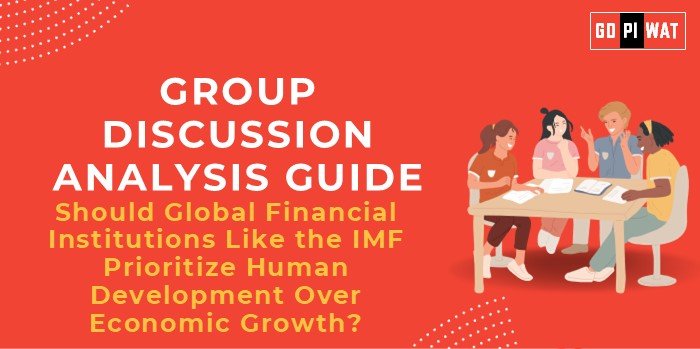📋 Group Discussion Analysis Guide: Should Global Financial Institutions Like the IMF Prioritize Human Development Over Economic Growth?
🌐 Introduction to the Topic
- Opening Context: Global financial institutions like the International Monetary Fund (IMF) have long prioritized macroeconomic stability and growth. However, with rising global inequality and human development concerns, a shift in focus is increasingly debated.
- Topic Background: Established in 1944, the IMF’s primary mandate is economic stabilization. Recent criticisms argue that its policies often overlook social indicators like health, education, and equitable growth. Discussions emphasize balancing growth-oriented programs with initiatives fostering sustainable human development.
📊 Quick Facts and Key Statistics
🌍 Global Inequality: Top 10% holds 76% of global wealth (World Inequality Report 2023) – highlights economic disparity.
📉 Human Development Index: 59 countries saw declining HDI scores in 2022 (UNDP) – reflects setbacks in human development.
💰 Debt Distress: 54 countries face severe debt crises (IMF, 2023) – economic policies need a human-centric lens.
📊 IMF Programs: $123 billion in lending commitments (2023) – focused mainly on financial stability rather than human welfare.
📉 Human Development Index: 59 countries saw declining HDI scores in 2022 (UNDP) – reflects setbacks in human development.
💰 Debt Distress: 54 countries face severe debt crises (IMF, 2023) – economic policies need a human-centric lens.
📊 IMF Programs: $123 billion in lending commitments (2023) – focused mainly on financial stability rather than human welfare.
👥 Stakeholders and Their Roles
- 🌐 IMF and World Bank: Formulate financial stabilization programs. Their involvement in social sector funding is minimal.
- 🏛️ Governments: Implement policies shaped by IMF advice; often balancing economic reforms with citizen welfare.
- 🌱 NGOs and Social Movements: Advocate for inclusive policies addressing healthcare, education, and poverty alleviation.
- 🌍 International Organizations: Entities like the UNDP push for integrating SDGs into financial programs.
🏆 Achievements and Challenges
✨ Achievements
- 📉 Reduced Inflation: Achieved in several countries through stabilization programs.
- ⚖️ Enhanced Fiscal Discipline: Promoted globally.
- 🌍 Assistance in Crises: Supported countries like Greece (2010) and Argentina (2018).
⚠️ Challenges
- ⚖️ Austerity Criticism: Measures often exacerbate poverty.
- 🌍 Lack of Tailored Approaches: Limited customization for developing nations.
- 📉 Neglect of Social Indicators: Insufficient focus on inequality, education, and healthcare.
🌍 Global Comparisons: Nordic nations demonstrate balanced growth and human development, serving as potential models for IMF programs.
📚 Case Studies:
- ❌ Greece: IMF austerity deepened economic hardship.
- ⚙️ Bangladesh: IMF-supported programs improved macroeconomics but lagged in addressing human development needs.
📢 Structured Arguments for Discussion
- ✅ Supporting Stance: “The IMF’s macroeconomic interventions have stabilized economies globally.”
- ❌ Opposing Stance: “IMF’s focus on fiscal austerity often undermines social welfare, deepening inequalities.”
- ⚖️ Balanced Perspective: “While economic stability is critical, integrating human development into IMF mandates ensures sustainable progress.”
🧠 Effective Discussion Approaches
- 🎯 Opening Approaches:
- “The IMF has a strong legacy in stabilizing economies, but the 21st century demands a human-centric approach.”
- “Rising global inequality challenges institutions like the IMF to rethink priorities beyond GDP growth.”
- 🤝 Counter-Argument Handling:
- Use examples like Norway’s balanced policies or IMF’s neglect of inequality during past crises.
📊 Strategic Analysis of Strengths and Weaknesses
- Strengths: Expertise in financial stabilization, access to resources, global influence.
- Weaknesses: Perceived insensitivity to human development, reliance on austerity measures.
- Opportunities: Partnerships with development agencies, integration of SDGs.
- Threats: Growing mistrust among developing nations.
🎓 Connecting with B-School Applications
- 💼 Real-World Applications: Policy recommendations for financial reforms integrating SDG goals.
- 📚 Sample Interview Questions:
- “Should the IMF adopt a social safety net mandate?”
- “What lessons can the IMF learn from the Nordic countries?”
- 💡 Insights for Students: Explore intersections between finance and sustainable development in projects or research.


